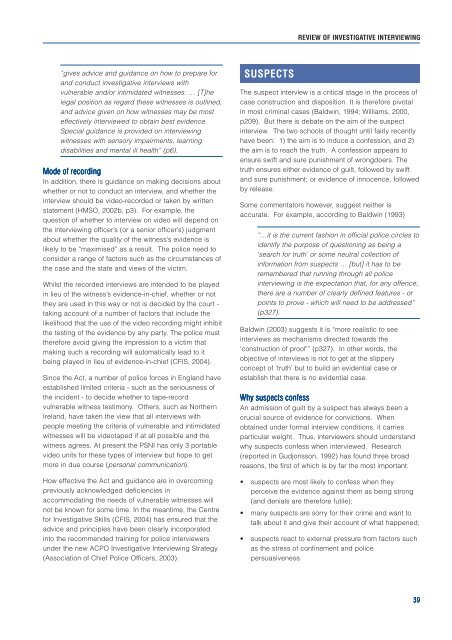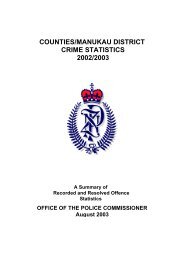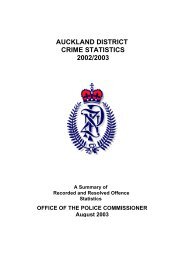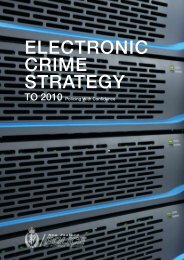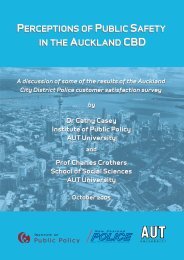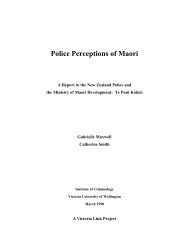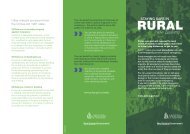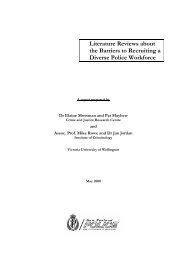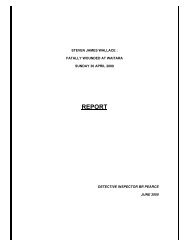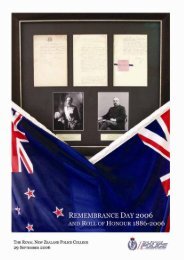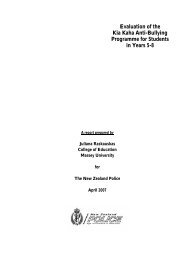Investigative interviewing: the literature - New Zealand Police
Investigative interviewing: the literature - New Zealand Police
Investigative interviewing: the literature - New Zealand Police
Create successful ePaper yourself
Turn your PDF publications into a flip-book with our unique Google optimized e-Paper software.
REVIEW OF INVESTIGATIVE INTERVIEWING<br />
“gives advice and guidance on how to prepare for<br />
and conduct investigative interviews with<br />
vulnerable and/or intimidated witnesses. … [T]he<br />
legal position as regard <strong>the</strong>se witnesses is outlined,<br />
and advice given on how witnesses may be most<br />
effectively interviewed to obtain best evidence.<br />
Special guidance is provided on <strong>interviewing</strong><br />
witnesses with sensory impairments, learning<br />
disabilities and mental ill health” (p6).<br />
Mode of recording<br />
In addition, <strong>the</strong>re is guidance on making decisions about<br />
whe<strong>the</strong>r or not to conduct an interview, and whe<strong>the</strong>r <strong>the</strong><br />
interview should be video-recorded or taken by written<br />
statement (HMSO, 2002b, p3). For example, <strong>the</strong><br />
question of whe<strong>the</strong>r to interview on video will depend on<br />
<strong>the</strong> <strong>interviewing</strong> officer’s (or a senior officer’s) judgment<br />
about whe<strong>the</strong>r <strong>the</strong> quality of <strong>the</strong> witness’s evidence is<br />
likely to be “maximised” as a result. The police need to<br />
consider a range of factors such as <strong>the</strong> circumstances of<br />
<strong>the</strong> case and <strong>the</strong> state and views of <strong>the</strong> victim.<br />
Whilst <strong>the</strong> recorded interviews are intended to be played<br />
in lieu of <strong>the</strong> witness’s evidence-in-chief, whe<strong>the</strong>r or not<br />
<strong>the</strong>y are used in this way or not is decided by <strong>the</strong> court -<br />
taking account of a number of factors that include <strong>the</strong><br />
likelihood that <strong>the</strong> use of <strong>the</strong> video recording might inhibit<br />
<strong>the</strong> testing of <strong>the</strong> evidence by any party. The police must<br />
<strong>the</strong>refore avoid giving <strong>the</strong> impression to a victim that<br />
making such a recording will automatically lead to it<br />
being played in lieu of evidence-in-chief (CFIS, 2004).<br />
Since <strong>the</strong> Act, a number of police forces in England have<br />
established limited criteria - such as <strong>the</strong> seriousness of<br />
<strong>the</strong> incident - to decide whe<strong>the</strong>r to tape-record<br />
vulnerable witness testimony. O<strong>the</strong>rs, such as Nor<strong>the</strong>rn<br />
Ireland, have taken <strong>the</strong> view that all interviews with<br />
people meeting <strong>the</strong> criteria of vulnerable and intimidated<br />
witnesses will be videotaped if at all possible and <strong>the</strong><br />
witness agrees. At present <strong>the</strong> PSNI has only 3 portable<br />
video units for <strong>the</strong>se types of interview but hope to get<br />
more in due course (personal communication).<br />
How effective <strong>the</strong> Act and guidance are in overcoming<br />
previously acknowledged deficiencies in<br />
accommodating <strong>the</strong> needs of vulnerable witnesses will<br />
not be known for some time. In <strong>the</strong> meantime, <strong>the</strong> Centre<br />
for <strong>Investigative</strong> Skills (CFIS, 2004) has ensured that <strong>the</strong><br />
advice and principles have been clearly incorporated<br />
into <strong>the</strong> recommended training for police interviewers<br />
under <strong>the</strong> new ACPO <strong>Investigative</strong> Interviewing Strategy<br />
(Association of Chief <strong>Police</strong> Officers, 2003).<br />
SUSPECTS<br />
The suspect interview is a critical stage in <strong>the</strong> process of<br />
case construction and disposition. It is <strong>the</strong>refore pivotal<br />
in most criminal cases (Baldwin, 1994; Williams, 2000,<br />
p209). But <strong>the</strong>re is debate on <strong>the</strong> aim of <strong>the</strong> suspect<br />
interview. The two schools of thought until fairly recently<br />
have been: 1) <strong>the</strong> aim is to induce a confession, and 2)<br />
<strong>the</strong> aim is to reach <strong>the</strong> truth. A confession appears to<br />
ensure swift and sure punishment of wrongdoers. The<br />
truth ensures ei<strong>the</strong>r evidence of guilt, followed by swift<br />
and sure punishment; or evidence of innocence, followed<br />
by release.<br />
Some commentators however, suggest nei<strong>the</strong>r is<br />
accurate. For example, according to Baldwin (1993)<br />
“…it is <strong>the</strong> current fashion in official police circles to<br />
identify <strong>the</strong> purpose of questioning as being a<br />
‘search for truth’ or some neutral collection of<br />
information from suspects … [but] it has to be<br />
remembered that running through all police<br />
<strong>interviewing</strong> is <strong>the</strong> expectation that, for any offence,<br />
<strong>the</strong>re are a number of clearly defined features - or<br />
points to prove - which will need to be addressed”<br />
(p327).<br />
Baldwin (2003) suggests it is “more realistic to see<br />
interviews as mechanisms directed towards <strong>the</strong><br />
‘construction of proof’” (p327). In o<strong>the</strong>r words, <strong>the</strong><br />
objective of interviews is not to get at <strong>the</strong> slippery<br />
concept of ‘truth’ but to build an evidential case or<br />
establish that <strong>the</strong>re is no evidential case.<br />
Why suspects confess<br />
An admission of guilt by a suspect has always been a<br />
crucial source of evidence for convictions. When<br />
obtained under formal interview conditions, it carries<br />
particular weight. Thus, interviewers should understand<br />
why suspects confess when interviewed. Research<br />
(reported in Gudjonsson, 1992) has found three broad<br />
reasons, <strong>the</strong> first of which is by far <strong>the</strong> most important:<br />
• suspects are most likely to confess when <strong>the</strong>y<br />
perceive <strong>the</strong> evidence against <strong>the</strong>m as being strong<br />
(and denials are <strong>the</strong>refore futile);<br />
• many suspects are sorry for <strong>the</strong>ir crime and want to<br />
talk about it and give <strong>the</strong>ir account of what happened;<br />
• suspects react to external pressure from factors such<br />
as <strong>the</strong> stress of confinement and police<br />
persuasiveness.<br />
39


